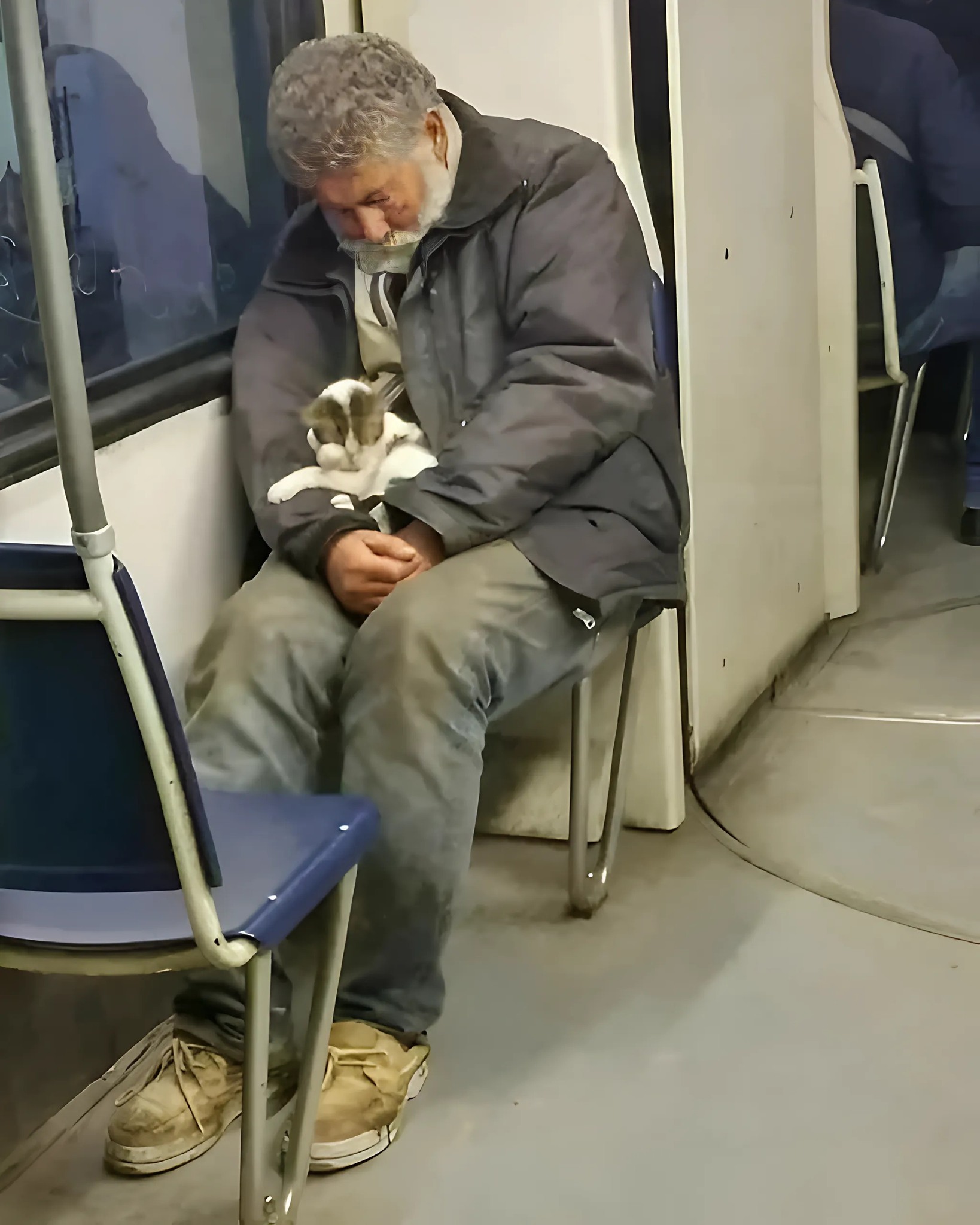When a homeless man found a shivering kitten in an alley, he thought he would just give it one warm night. What happened next will restore your faith in humanity.
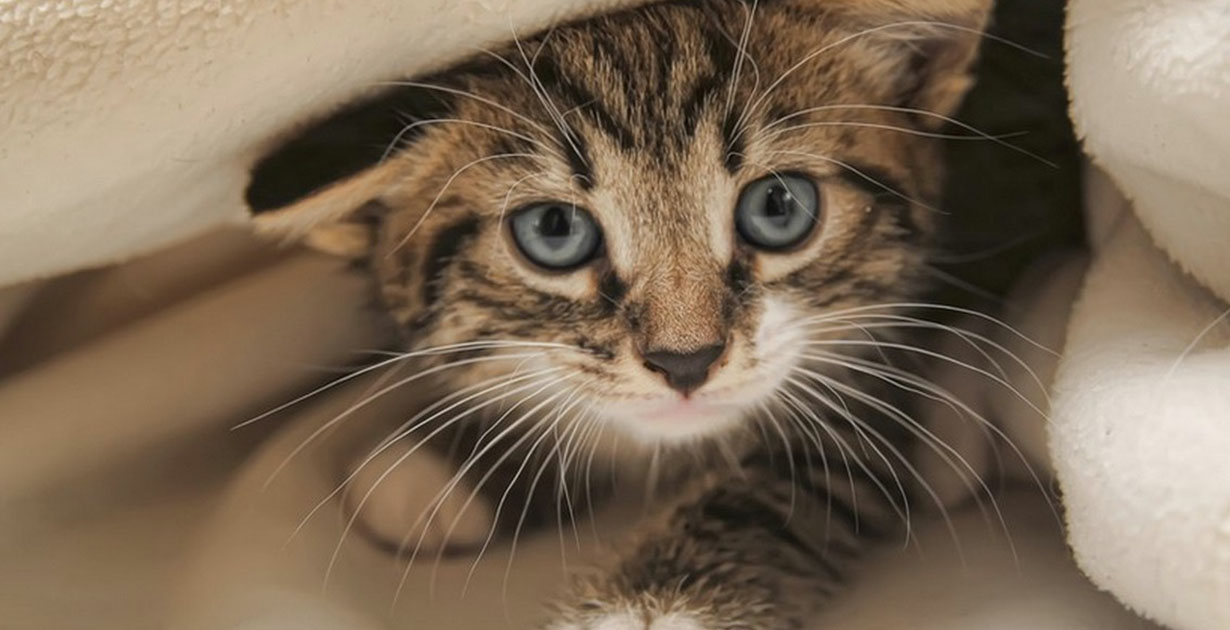
The 10:15 p.m. Blue Line train rumbled through the city like a tired sigh, its fluorescent lights flickering over passengers lost in their phones or dozing by fogged windows. At first I barely noticed the man – just another figure in a shabby coat, his shoulders hunched against the world. But then I saw what he was holding in his arms, and my breath caught.
A tiny ball of grey fur, so small it could fit in the palm of my hand, curled up on his chest like a living heart. Its paws rhythmically kneaded the frayed edge of his scarf, its purr audible even through the creaking of the rails. The contrast was stark: his cracked hands with dirt under their nails, holding her as gently as if she were made of glass.
I lowered myself into the seat across from him. Up close I could make out the kitten’s ribs under the damp fur, the way its claws snagged on the wool of his sleeve – it didn’t try to break free, just clung to this stranger, smelling of rain and old bread. ‘Is she yours?’ I asked.
He didn’t look up at first, just ran a big calloused finger over the kitten’s head, a gesture so gentle it hurt. ‘No,’ he said finally. ‘She found me.’ His voice was rough but quiet, the kind of voice he hadn’t used much lately.

Three nights earlier, he’d heard a sound like crumpled paper behind the bakery’s rubbish bin. There she was – half-drowned in a puddle, her squeak thinner than the shadows in the alley. He gave her the last bite of his ham sandwich (the meat had been torn into pieces small enough for her tiny mouth) and wrapped her in the only dry thing he had: a moth-eaten scarf that still held the faint scent of cedar from better times. ‘Thought I could give her one warm night,’ he admitted. ‘But when morning came, instead of running away, she climbed into my coat.’
I asked where they were going now. Then he showed me the napkin – the edges were soft from being folded and re-folded in his pocket. In smudged blue ink it said, ‘She answers “Mina”. Please don’t leave her behind. If you find her, bring her home.’ On the back was a phone number. And at the bottom, three words that made my throat constrict: ‘Her little girl.’
The train jerked around a bend, and the man-as he told me, Silas-automatically put his arm around Mina to comfort her. She blinked sleepily, her mismatched eyes (one gold, one green) squinting against the light. I noticed that the sleeves of his coat were frayed at the cuffs, but the kitten’s fur was clean, no dirt sticking to his nails. Apparently he’d bathed her somehow.
As the stations whizzed by, Silas spoke in scraps. About how he’d worked as a mechanic before the plant closed. About how his wife’s medical bills had eaten up all their savings long before she got cancer. How he stopped counting the days on the streets when he realised no one would come looking for him. ‘But that little thief,’ he said, affectionately rubbing Mina’s nose, ’she used to steal my shoelaces all the time, like she wanted me to stay put.
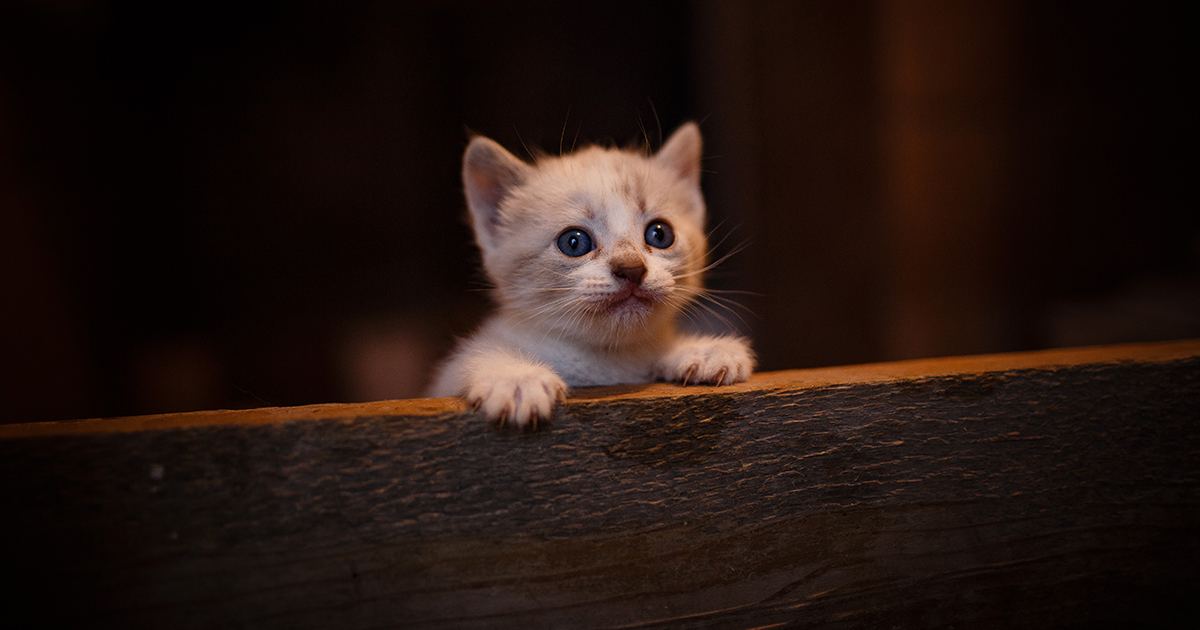
When we got to Sixth and Maple, the platform was almost empty. Silas moved with the cautious gait of a man used to being told to move on, but his grip on Mina never loosened. The promised bench was in place, its wood warped from the weather. We waited for the streetlights to come on overhead, Mina in Silas’s arms alert, her ears twitching with every distant howl of a siren.
Then a sigh. A young woman was running towards us, her unlaced trainers slapping on the concrete. ‘MINE!’ The relief in that scream sent shivers running down my spine. She collapsed to her knees in front of Silas, her hands fluttering over the kitten like she couldn’t believe it existed. Up close, I could make out her shabby nail polish and the dark circles under her eyes. ‘I’ve been putting up flyers for a few days now,’ she said, panting as she nuzzled Mina’s cheek. The kitten immediately started licking away her tears.
Anya, as she introduced herself, explained, gasping, that Mina was the last living link to her mother. ‘Mum found her in the car park a year before she died. Said Mina was her ‘little guardian angel’. When I had to move after the eviction notice…’ She hesitated, shame flashing across her face. Everything fell into place: the hastily scribbled note, the public meeting place. Anya was living in her car.
What happened next resisted all my cynical bones. Anya tried to shove a wad of money into Silas’s hand. He stepped back as if burned. ‘I didn’t do it for the money,’ he said so quietly that I almost let it pass my ears. Something in his tone made Anya stop. She actually looked at him – not just at the stained coat and broken shoes, but at the kindness in the way he handed Mina over, making sure their fingers didn’t touch so as not to startle her.
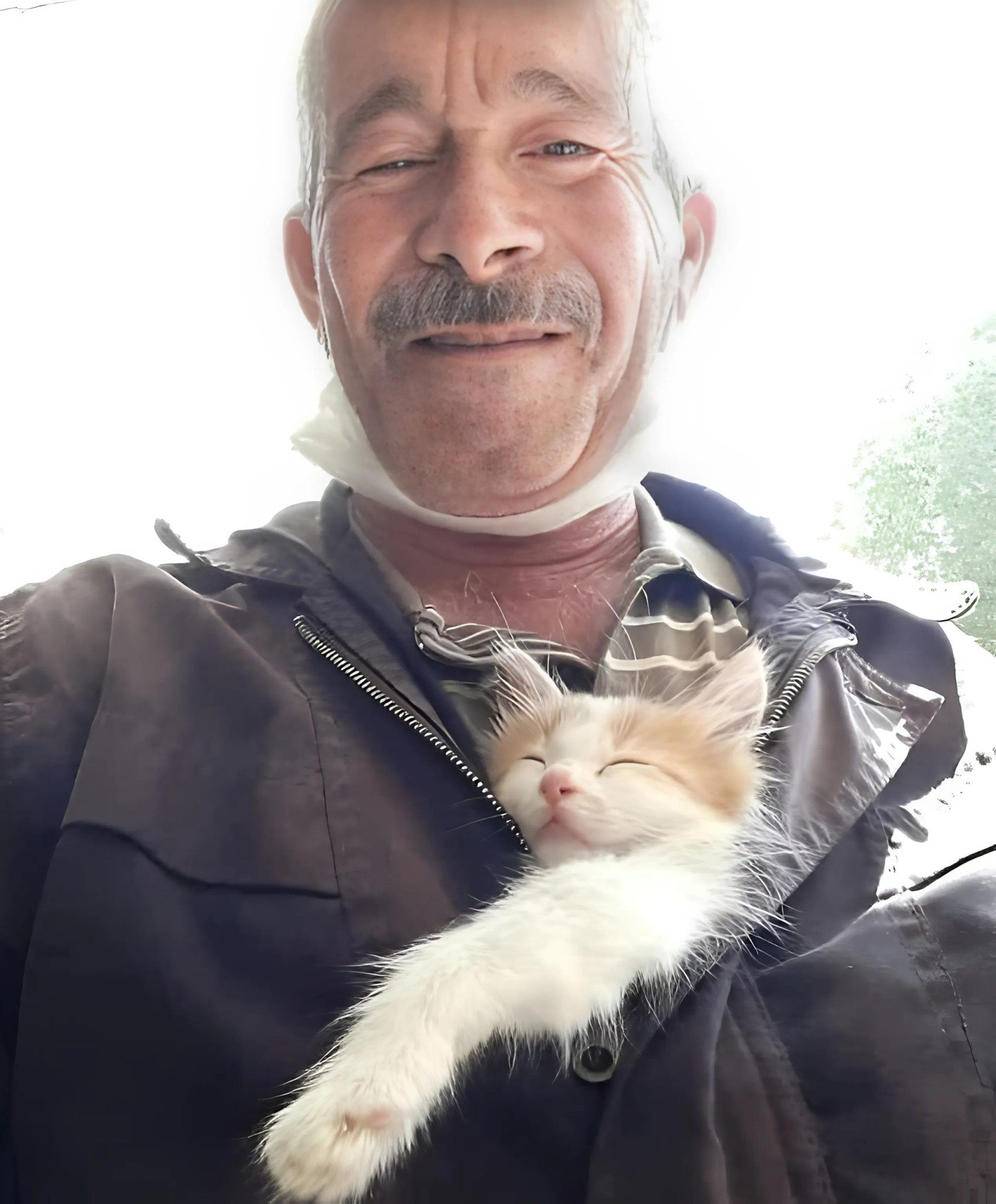
Over terrible coffee at the petrol station (Anya had insisted on it), the conversation took an unexpected turn. Silas mentioned that he’d been a volunteer firefighter in his twenties. Anya’s eyes lit up. ‘The shelter where I shower really needs someone to fix the plumbing.’ Standing for a moment. ‘It pays eighteen dollars an hour there.’
Here’s what the napkin didn’t tell us: Anja’s mother was a social worker who founded Hope’s Corner, a day shelter three blocks from this bench. When Silas showed up the next morning with tools borrowed from the caretaker’s closet, the director immediately recognised Anya’s description. ‘Lena’s daughter said you were coming,’ she said, holding out the key to him.
And what really happened? The plumber’s job had turned into a part-time maintenance job. The job had turned into a tiny studio flat above the shelter when Silas mentioned he was sleeping behind the library. And Anya – grieving, struggling but determined – used her mother’s old connections to get a grant for the Lena Foundation, a programme that connects adoptable homeless animals with shelter residents. Silas became their first official guardian – a role that came with veterinary benefits and, more importantly, a community that didn’t waver from his past.
From what I hear, Mina – now a plump, glossy-coated diva – divides her time between Anya’s new flat and Silas’s office at the shelter, where she dozes in a donated chair dubbed ‘The Throne.’ Above it, an original doily hangs in a frame, a reminder of how one act of compassion can untangle the tightest knots of loneliness.
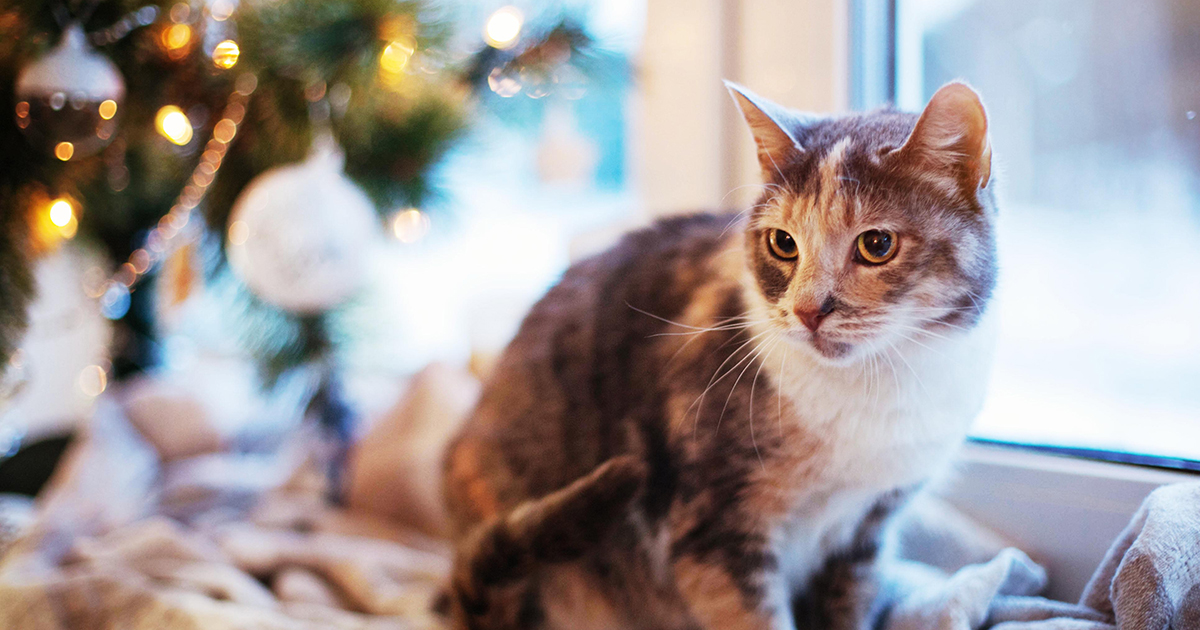
The unspoken truth of this story: We are taught to believe that help comes from institutions – social services, charities, systems. But sometimes rescue wears a threadbare coat and carries a kitten in its pocket. Sometimes the person who needs rescuing the most is the one who rescues. And sometimes, despite everything, a damp alley and a crumpled piece of paper can rewrite destinies.
So the next time you see someone the world has labelled ‘invisible’, remember Silas and Mina. Remember that the most powerful forces in this world are not money or power, but the willingness to share your last sandwich, fold a note with trembling hands, and say ‘I see you’ without saying a word.
